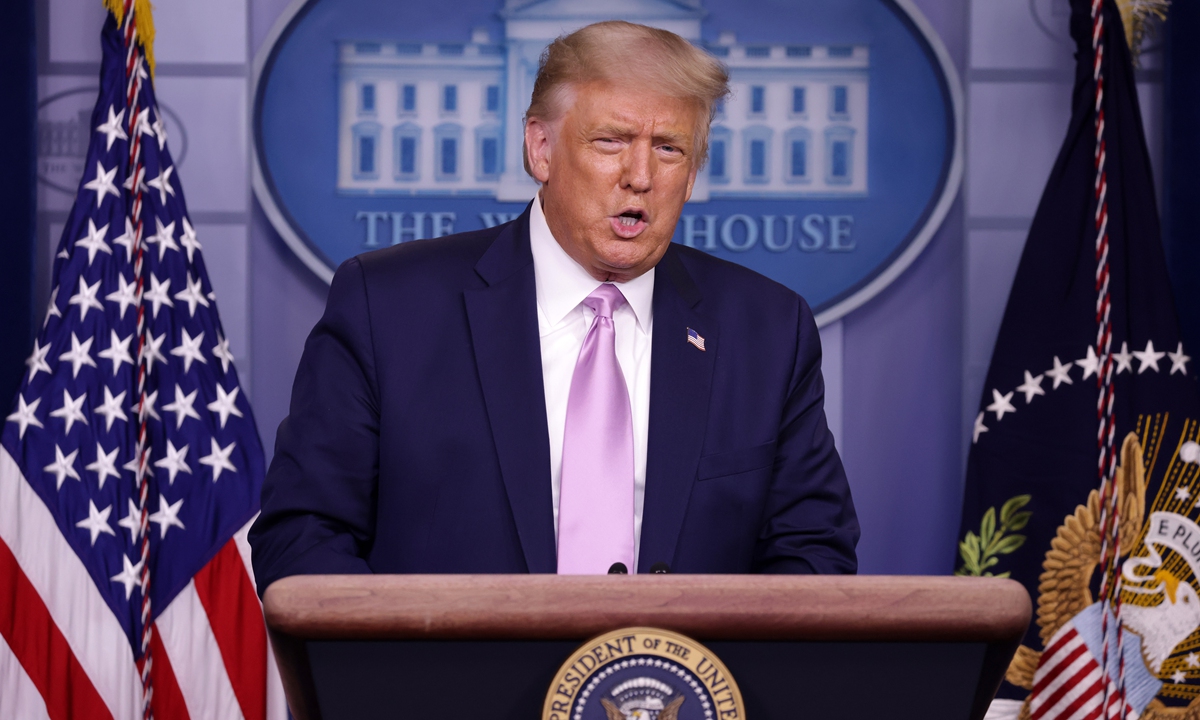Paranoid US scapegoats China for its inability and domestic problems
By Song Guoyou Source: Global Times Published: 2020/8/27 17:54:59

U.S. President Donald Trump speaks during a news conference in the James Brady Press Briefing Room of the White House on Tuesday in Washington, DC. Photo: AFP
US President Donald Trump has recently repeated the old tune, claiming that the US has "got nothing out of China" and "all we [the US] do is lose money" by trading with China.
Has Washington really suffered losses? Certainly not.
As early as 2018, China had published a white paper to clarify the facts about China-US economic and trade relations and demonstrate its stance on trade friction with the US. The conclusion found that China-US economic and trade cooperation is mutually beneficial. Arguments saying that China has gained unilaterally, or that the US has suffered a lot, are groundless.
With China adjusting its pattern in economic development and striving to create an enormous domestic market, the US stands to gain handsomely from this. Washington is paying attention to this one-side picture of the US trade deficit in goods with China, hysterically regarding the deficit as loss instead of noting the clear benefits of the US.
Such calculation is clearly incorrect. Many rational and objective US analysts disapprove of Trump's claims that the US is being taken advantage of. However, this rhetoric still echoes among Trump's supporters.
The first reason is most of Trump's supporters come from groups with very poor education, especially whites without a university degree. To have a clear picture of the real distribution of economic and trade benefits between China and the US requires a sharper set of academic skills than they have.
Second, Trump's supporters are mostly ordinary workers, especially those in the manufacturing sector, who are facing hard times. Most of US transnational capital groups that have achieved huge gains from economic and trade activities with China choose to support the Democratic Party. Evident partisan differences have made Republican voters more inclined to be deceived about China. They incorrectly think that China has been taking advantage of the US.
Third, there is still a spillover of US domestic social contradictions that need to be addressed. In recent years, the living standard of ordinary Americans has not improved remarkably. In addition, the middle class is gradually shrinking. Therefore, domestic and social contradictions are increasingly striking. The dissatisfaction and protests from the middle and lower income classes against the rich will increase. Pressure will need to be released. When these cannot be tackled at home, they will normally spill over into the intentional arena.
This is the dilemma now as the US' domestic problems are ignored and fictive foreign problems enlarged. This means the more that economic problems and contradictions form in the US the more Washington will target Beijing as a scapegoat. In a bid to prove the veracity of its accusations toward China, the US will more proactively make policies to "decouple" from and suppress China.
If Washington insists on "decoupling," how should Beijing deal with that? First, China needs strategic confidence. The US' intensive "decoupling" policy against China will continue to affect some Chinese industries and companies. However, considering China's current economic scale, development trends, capable governance, and pandemic coping mechanisms, the US "decoupling" policy will hardly have a disruptive impact on China's overall development.
Second, China will accelerate the pace to develop its international and domestic economic system. "Decoupling" will stimulate China's determination to construct a more independent economic system internally and internationally. This will help China get rid of its reliance on the US. The "dual circulation" development pattern of China's economic system requires comprehensive support from market, science and technology, finance, and resources. China has to make further efforts in these four domains.
Last but not the least, Beijing should play a proactive role to maintain the existing pattern of the global industrial chain. Although globalization is confronting temporary countercurrents, the global economic system remains stable as a whole. The US alone cannot "decouple" from China, while the notion of "decoupling" from China in global industrial chain is bound to undermine the interests of other economies. Therefore, China needs to attain and keep the support of pivotal countries involved in global industries in order to counterbalance and resist US attempts to "decouple" from or blockade China.
The author is deputy director of Center for American Studies, Fudan University. opinion@globaltimes.com.cn
Posted in: VIEWPOINT,CHINA-US